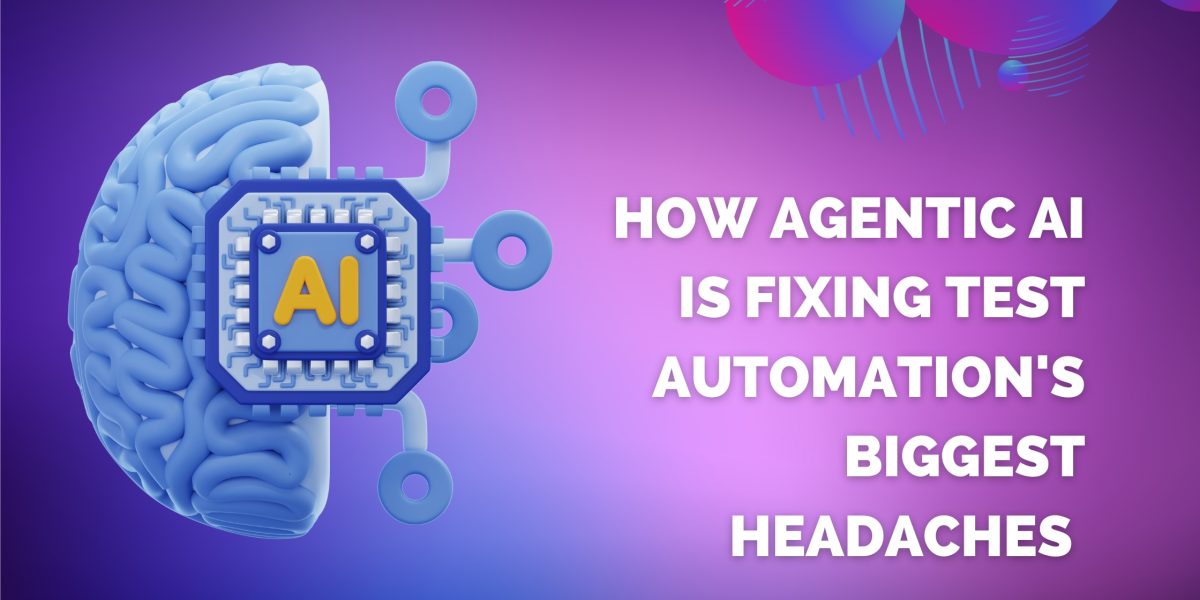The rapid evolution of artificial intelligence (AI) is transforming the software testing landscape, unlocking new levels of speed, scalability, and precision. One of the most promising developments in this domain is Agentic AI — a paradigm that introduces intelligent, autonomous agents capable of making decisions, adapting to new inputs, and continuously learning from their environment. As organizations look to deliver superior digital experiences faster than ever, Agentic AI emerges as a game-changer in the world of test automation services.
This blog explores the transformative role of Agentic AI in test automation, detailing how it enhances efficiency, reduces costs, and redefines the scope of artificial intelligence testing services. We’ll also discuss use cases, benefits, and best practices to help enterprises navigate this shift.
The Cracks in Traditional Test Automation
For years, test automation depended mainly on predefined scripts that performed specific procedures. While this paradigm provided considerable advantages over manual testing, it has inherent constraints that many QA teams face on a regular basis:
- The Brittleness Bottleneck
Scripts are often tightly coupled to the application’s UI or underlying structure. Minor changes—a button moved, an ID updated—can break entire test suites, leading to constant, time-consuming maintenance cycles. This fragility is amplified when dealing with diverse platforms, making reliable cross-browser testing services a significant upkeep challenge.
- The Script Creation Slog
Designing, writing, and validating test scripts, especially for complex applications, demands significant upfront time and specialized coding skills. This can create bottlenecks, slowing down the feedback loop to development.
- The Coverage Conundrum
Ensuring comprehensive test coverage is difficult. Manually designed scripts might miss subtle edge cases or complex interaction scenarios. Prioritizing what to automate often involves difficult trade-offs, potentially leaving gaps where critical defects can hide.
- The Test Data Tangle
Generating realistic, varied, and compliant test data is a major hurdle. Manually creating or managing large datasets is cumbersome, and ensuring data privacy (like masking PII) adds another layer of complexity. Static or irrelevant data leads to ineffective tests.
- The Scalability Struggle
As applications become more complex and test suites expand, managing and executing traditional automation frameworks can become unwieldy. Scaling often requires a linear increase in infrastructure and human resources.
- The Pace Problem
In rapid Agile/DevOps cycles, automation suites need to adapt quickly. Traditional methods’ maintenance overhead and script creation time often lag behind development sprints.
These challenges mean that instead of solely focusing on quality assurance strategy, teams often spend excessive time simply keeping their automation afloat.
Enter Agentic AI: Automation That Thinks, Learns, and Adapts
Agentic AI is one of the most significant breakthroughs affecting test automation services. It brings actual intelligence to the automation process instead of rigid systems that just follow predefined rules. Large language models and advanced machine learning are utilized to create self-governing “agents” capable of seeing, reasoning, making decisions, and acting with minimal human intervention.
Imagine the transition from basic automated systems doing predetermined duties to a group of highly skilled digital professionals. To address complex problems, these AI bots work together, frequently under the direction of a central controller. Here’s what sets Agentic AI apart:
- Intelligent Decision-Making: Exceeds basic “if-then” reasoning to assess circumstances, comprehend background, and make defensible decisions.
- Continuous Learning: Gains knowledge from previous outcomes, user comments, and evolving application environments to gradually increase accuracy and efficiency.
- Dynamic Adaptability: Adapts automatically to modifications in the underlying code or user interface of the program. A crucial component of efficient cross-browser testing services, this resilience dramatically lowers test script fragility and maintenance.
- Enhanced Autonomy: Allows human teams to focus on more strategic, high-level activities by handling complicated sequences and unforeseen deviations without frequent manual intervention.
This advancement in cognitive automation is changing possibilities. Top test automation providers, who now provide advanced artificial intelligence testing services, are progressively adding these features. In addition to being speedier, agentic AI is smarter, more robust, and essentially more efficient automation tailored to the intricacies of contemporary software development.
Agentic AI Tackles the Hurdles Head-On
The practical application of Agentic AI in software testing directly confronts and solves the persistent headaches inherent in traditional test automation services. This marks a shift away from rigid execution; leveraging intelligent, adaptive agents offers tangible solutions to the challenges QA teams constantly face. Agentic AI actively analyzes, adapts, and optimizes, tackling limitations head-on, rather than just following predefined steps.
Here’s how Agentic AI addresses specific traditional automation hurdles:
Solving Brittleness & Maintenance
Agentic AI employs intelligent object recognition. Instead of relying solely on fixed locators, AI agents learn to identify UI elements more robustly, adapting automatically to minor changes in the interface. This dramatically reduces script failures and maintenance time, which is especially crucial for maintaining consistent quality across different browsers and devices. It enhances the value proposition of cross-browser testing services.
Accelerating Test Creation
Specialized agents can interpret functional requirements directly from documents (use cases, user stories), translate them into test scenarios, or even generate test scripts automatically, using formats like Gherkin BDD. This drastically cuts down the manual effort and time involved in test design.
Boosting Coverage Intelligently
Agentic AI analyzes applications and requirements more deeply, exploring execution paths and generating test cases for complex scenarios and edge cases that humans might miss. Its ability to adapt test strategies based on real-time findings ensures more comprehensive and risk-based coverage.
Mastering Test Data
AI agents can autonomously generate, manage, and validate test data. They understand the context needed (e.g., specific formats for insurance claims), can create synthetic data that mirrors production realism, and automatically handle sensitive data masking (PII), ensuring compliance and data relevance.
Enabling Seamless Scalability
Agentic systems are inherently more scalable. They can handle increased testing loads and application complexity more dynamically, often without requiring a proportional increase in human oversight or infrastructure, optimizing resource utilization.
Syncing with Speed (Agile/DevOps)
The continuous learning and rapid adaptation capabilities of Agentic AI align perfectly with the iterative nature of Agile and DevOps. Tests can be generated, updated, and executed much faster, providing quicker feedback within CI/CD pipelines.
The Proof is in the Performance: Measurable Results
This isn’t science fiction. Organizations implementing Agentic AI principles in their testing are already seeing significant, measurable benefits across various industries:
- Finance: Achieving up to 40% reduction in compliance costs through automated stress testing and validation. Real-time fraud detection testing enhanced significantly.
- Telecom: Slashing defect detection time by as much as 85%, enabling faster feature rollouts.
- Insurance: Reducing claims processing test cycles by up to 70% through end-to-end automation of decision-intensive workflows.
- Retail: Optimizing inventory system testing, leading to reported 40% reductions in stockout/overstock issues.
- Healthcare: Accelerating testing phases in drug discovery processes by months.
- Manufacturing: Cutting equipment downtime by 30% through improved testing of predictive maintenance AI.
These outcomes translate directly to faster time-to-market, lower costs, higher quality software, and reduced business risk.
Navigating Your Journey to Intelligent Automation
Adopting Agentic AI isn’t a simple switch flip. It requires careful planning and consideration:
- Implementation Effort: Setting up the infrastructure and training the AI agents takes time, expertise, and investment.
- Data is King: Agentic AI’s performance hinges on access to high-quality, comprehensive, and unbiased data.
- Human Oversight & Ethics: While autonomous, these systems require governance. Human oversight is crucial for validating critical decisions, ensuring ethical considerations (fairness, transparency), and building trust.
This is where strategic collaborations may be quite beneficial. Many firms are looking to professional test automation service providers that have the knowledge and platforms to deliver these sophisticated solutions. Using specialist artificial intelligence testing services may help bridge skill gaps, expedite adoption, and guarantee best practices are followed, resulting in a higher return on investment.
Concluding Thoughts
Agentic AI represents a significant break from the brittle scripts and maintenance difficulties that have long plagued traditional test automation. By incorporating intelligent agents capable of learning, adapting, and making autonomous decisions, it immediately addresses and resolves important difficulties such as test generation speed, coverage depth, data complexity, and scalability. The demonstrable benefits—shorter time-to-market, lower costs, and much greater software quality—are clear.
As enterprises seek excellence in their digital products, employing Agentic AI becomes increasingly important. Partnering with skilled professionals providing test automation and specialized artificial intelligence testing services can help expedite this transition while also assuring comprehensive quality assurance (QA). Embracing this sensible transition is no longer a choice; it’s a strategic must for remaining competitive in today’s rapidly changing software market.












